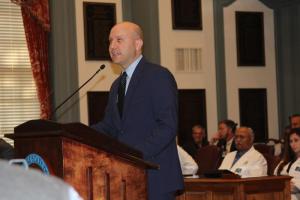Healthcare professionals showed up in force May 7 for the second time in less than a month to protest a bill that would create state overview of hospital budgets, as a second bill was introduced the same day to change benchmark spending caps included in the main bill.
It was signed out of committee May 8 and is ready for action in the full Senate.
House Bill 350 would create a seven-member Diamond State Hospital Cost Review Board – paid by taxpayers and appointed by state officials – tasked with annually reviewing hospital budgets to keep costs down. Members would make $35,000 per year while the chair would get $40,000. As written, the bill addresses Medicare costs in relation to hospital costs by placing a cap of 250% of Medicare costs to any payer for hospital services in calendar year 2025.
Due to the proposed cap on commercial reimbursement for Medicare, Dr. David Tam, president and CEO of Beebe Healthcare, in a previous interview said Beebe is projected to lose more than $60 million in the next two years, with an estimated statewide loss for all hospitals to be around $360 million. This is even before the creation of the Diamond State Hospital Cost Review Board, appointed by the state, that would be tasked with reviewing and possibly modifying the annual budgets of the state's hospitals, he said.
HB 350 passed the House by a 21-16 vote with four absent April 26.
“The reality is healthcare costs in Delaware are some of the highest in the country,” said Sen. Bryan Townsend, D-Newark, the Senate sponsor of the bill.
He also said legislation was in play to change the Medicare cap. Introduced May 7, HB 395 would temporarily replace the 250% Medicare cap with a 2% increase over the previous year or the consumer price index increase plus 1%, whichever is greater. The change would cover years 2025 and 2026 only. The bill flew through committee May 8, and awaits action in the full House.
The bill was largely modeled after Vermont’s Green Mountain Care Board, which former Department of Health and Social Services Secretary Kara Odom Walker, who now works for Nemours Children’s Health, said she is familiar. She said the board was intended to be collaborative but then “went sideways,” leaving families who could afford it to go elsewhere for healthcare.
Dr. John Brumstead has worked as a physician in Vermont and said the Green Mountain Care Board has no accountability, which has resulted in declining hospital margins. Access is also tough, and those who can go to neighboring healthcare systems do so.
“This non-collaborative environment really stands out,” he said.
Sen. Brian Pettyjohn, R-Georgetown, questioned setting spending limits for others when the state never meets its own limits.
“The benchmark that is set … is it realistic?” he asked. “Here we are saying hospitals are bad for blowing through their benchmark but we’re doing it here.”
Brian Frazee, president and CEO of the Delaware Healthcare Association, who speaks on behalf of Bayhealth hospitals and others, said Delaware is different from Vermont and Massachusetts because of the growing population.
Population growth, especially senior citizens, comes with more healthcare needs, and a need for more facilities.
“We need to maintain growth to maintain care,” he said.
Frazee said hospitals are particularly concerned with the enforcement aspect of the bill, and they would welcome collaboration on the matter.
Senate Minority Leader Sen. Gerald Hocker, R-Ocean View, questioned figures that place Delaware’s healthcare among the worst in the country.
“You have to compare apples to apples. I hear all the time that there is such a doctor shortage here,” he said.
Hocker said he was recently told that Sussex County is short by at least 100 physicians.
“This legislation is not going to fix it, it’s going to make it worse,” he said.
Townsend said down the road legislators must look at pharmaceutical and labor costs as contributing factors in increased healthcare spending.
“Until we have transparency, it’s hard to get our heads and hear around these issues,” Townsend said.
Melissa Steele is a staff writer covering the state Legislature, government and police. Her newspaper career spans more than 30 years and includes working for the Delaware State News, Burlington County Times, The News Journal, Dover Post and Milford Beacon before coming to the Cape Gazette in 2012. Her work has received numerous awards, most notably a Pulitzer Prize-adjudicated investigative piece, and a runner-up for the MDDC James S. Keat Freedom of Information Award.














































